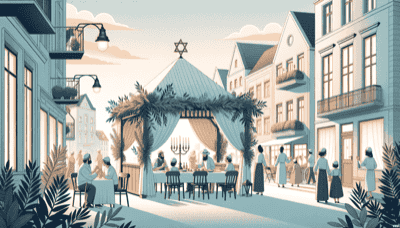We're here to help you keep count of the days to or since a date. Just click the button below and enter your chosen date to get started. Also choose the suggested days or search for a special day above #countingthedays

Sukkot is a Jewish festival that lasts for seven days, with the first day traditionally being a full holiday and the second day traditionally observed with similar, though slightly relaxed, practices. In Israel, Sukkot is celebrated for one day, while outside of Israel, including Germany, the Jewish communities celebrate the first two days as full holidays. This is due to an ancient practice from when the calendar was based on lunar sightings; an additional day was added to ensure the holiday was not missed.
The history of Sukkot dates back to biblical times when it was instituted as one of the three pilgrimage festivals. It commemorates the forty years that Jews wandered in the desert after escaping from slavery in Egypt and also celebrates the harvest season.
On the second day of Sukkot in Germany:
Dwelling in the Sukkah: Jews continue to perform the mitzvah (commandment) of dwelling in a sukkah—a temporary hut-like structure with a roof made of natural materials—by eating meals there and spending time within it.
Four Species: Participants continue to perform the ritual waving of the Four Species (etrog, lulav, hadassim, and aravot), which symbolize unity and harvest.
Prayers: Special prayers are recited during synagogue services. The Hallel (praises), consisting of Psalms 113-118, is chanted. The prayer service also includes a prayer for rain, appropriate for this harvest festival.
Holiday Meals: Festive meals are enjoyed inside the sukkah with family and friends.
In contemporary Germany, where religious freedom is protected by law, Jewish communities celebrate Sukkot according to their traditions. As part of Jewish life restored after WWII and despite its tragic history during that period, these celebrations represent both remembrance and renewal for German Jews.